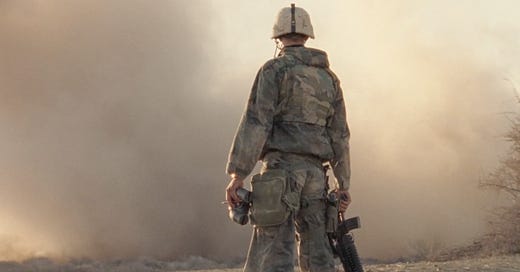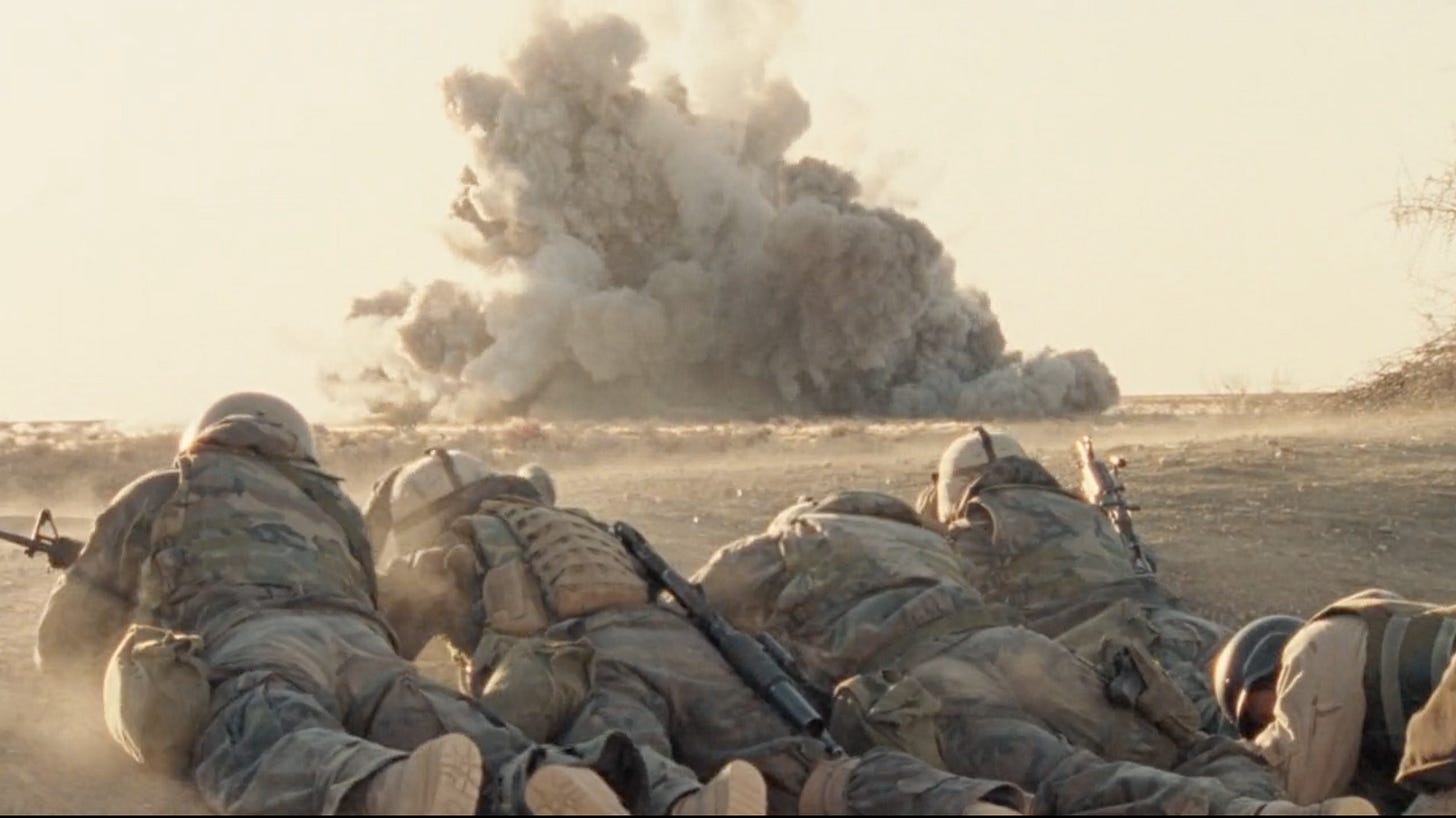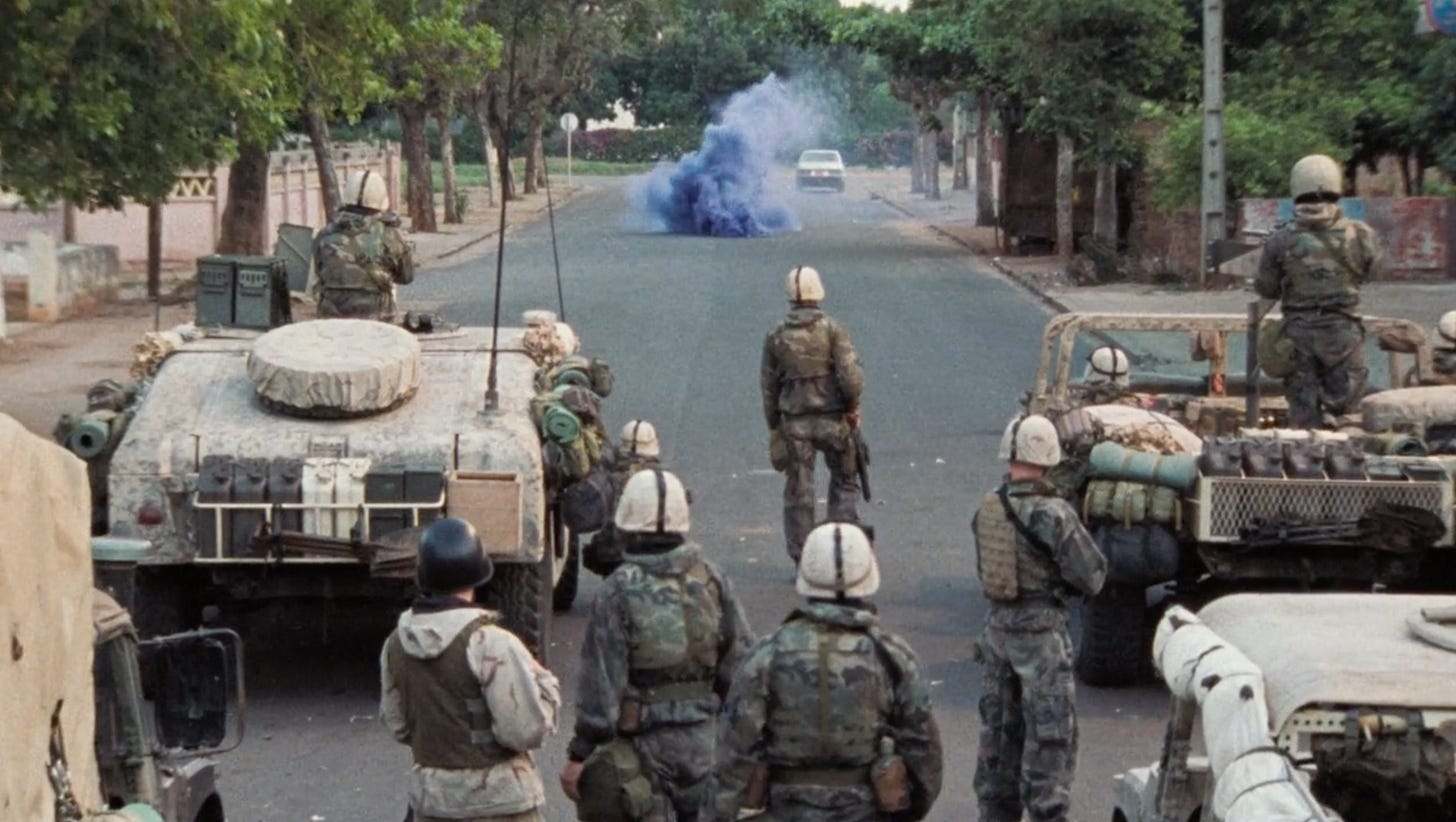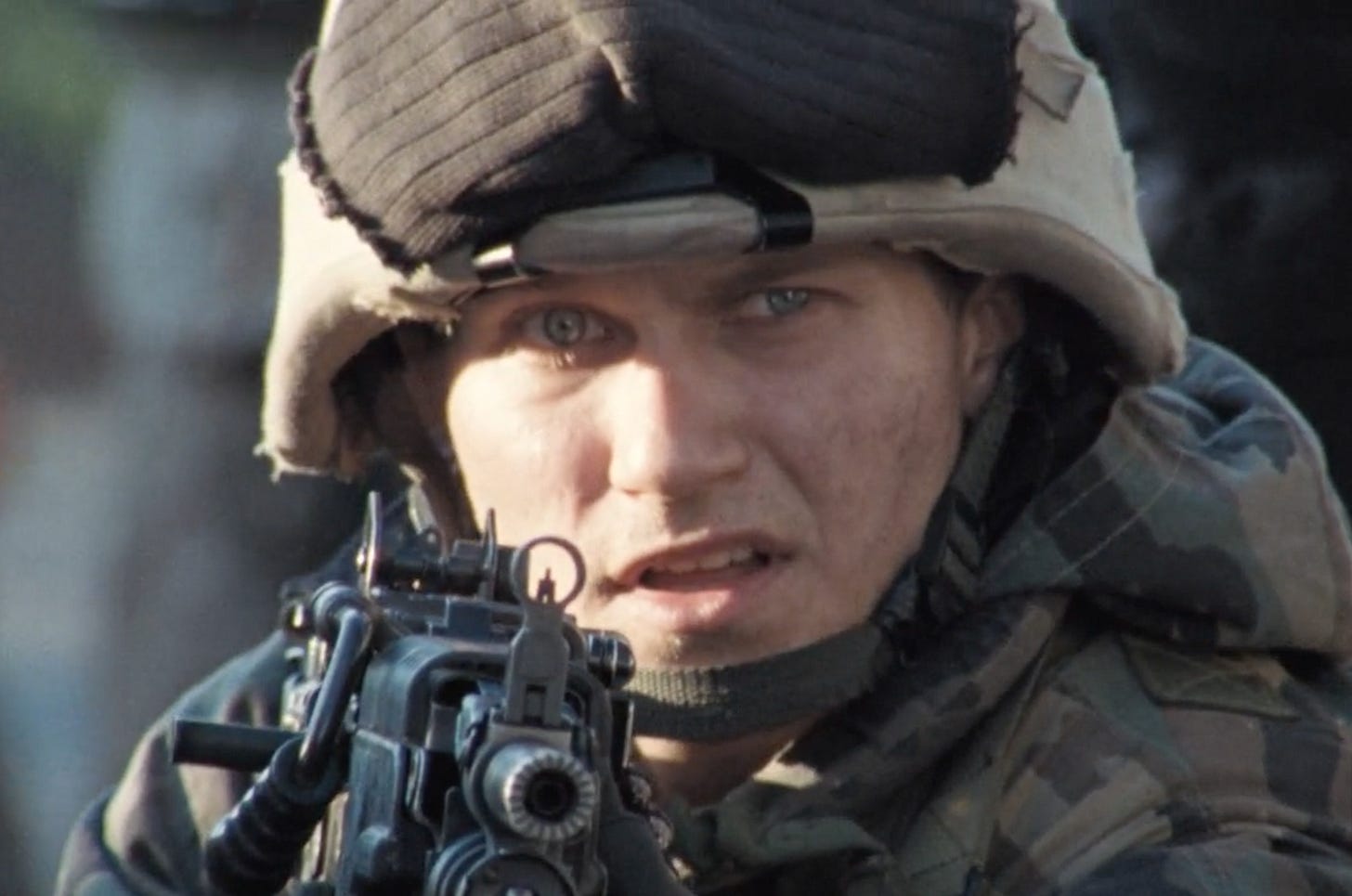‘Man, we keep making the same fucking mistakes,’ Cpl. Walt Hasser complains as he and his platoon watch their air support bomb a hamlet during the first few days of the American invasion of Iraq in 2003. The artillery strike comes out of nowhere. One moment the Reconnaissance Marines of Bravo Company, Second Platoon, are enjoying some downtime, watching kids play soccer, the next the kids are gone and with them their homes, their families and their lives. While this sequence happens at the beginning of “A Burning Dog”, the fifth episode of HBO’s Generation Kill (2008), it could just as easily happen in any episode of the limited series. In fact, as Hasser hints, it does happen in other episodes.
Ten minutes into Episode Three, “Screwby”, the platoon watches another hamlet be blown up. Again, they’re watching kids when auxilary support team, RCT One, arrives and begins to shoot at the village. Within moments the place is being bombed. Despite having scouted the area and knowing there’s no threat, Bravo can’t prevent the attack since they don’t have comms with the other units. It’s the same problem in “Stay Frosty”, the sixth episode, when Delta Company—the reserve outfit of the Recon Marines—lights up a village. ‘Get those guys on the net,’ Sgt. Brad Colbert demands only to be told that’s not possible. ‘It got passed down,’ Cpl. Ray Person tells him, ‘We’ve got no comms with Delta.’ And so, because of a communication failure, another village is reduced to rubble.
Hasser isn’t exaggerating, the same mistakes are made over and over again during this war. The Recon Marines do some recon, establish that something is not a threat, and someone else elects to destroy it anyway. There’s no indication that leadership ever considers these targetless bombings war crimes or even reflects on them. They simply rinse and repeat.
While this has all the hallmarks of what I consider a time loop set up (and what typical analytical speak would call narrative repetition or “iteratitive” narration), these bombings don’t happen just to benefit the narrative structure. Gen Kill is based on Evan Wright’s journalistic book of the same name; an account of his time embedded with Bravo as Rolling Stone’s war correspondent during the invasion. While the show is fictionalised, it was helmed by David Simon and Ed Burns (both of The Wire) and Wright himself, lending it a pedantic fidelity to the book and, by extension, reality. The bombing of these three hamlets did happen. Not only that, but the incompetencies of command that led to their destruction happened as well.

Throughout Gen Kill, battalion commanders refuse to learn. They would rather let time repeat itself than risk potential medals by delaying the invasion. Evil, as with other Simon and Burns’ shows, is found in bureaucratic decision making, rather than the individual. It is the “chain of command” that has blood on its hands, demanding a soldier execute orders from his superiors without question. Corporals answer to sergeants who answer to lieuntenants who answer to captains who answer to colonels who answer to generals who answer to the President who answers to the United States of America/God. It’s never an individual’s fault but the guy above him’s. And if it’s never anyone’s fault no one takes accountability for his mistakes and course corrects. So the same thing is done and the same result is returned. And children die.
This is how the invasion works. The guys on the ground can be worth a million dollars — trained to get in, get the information and get out — but if their superiors don’t listen to them then it’s all for nought. The Americans came to Iraq to kill. They don’t care about intelligence. They don’t care if the justification for the war (rumours of chemical weapons) turns out to be false. They don’t care if the cities and towns and villages they bomb are filled with civilians and not a single enemy soldier. America came to demonstrate its strength and that’s what it’ll do. Over and over and over again until the rest of the world gets the message.
Gen Kill doesn’t shy away from making a point of this. The bombed hamlets are not the only recurring mistake we see. Two roadblocks, in two separate episodes, result in the accidental shooting of civilians. The first victim is a child, shot at long distance in the back of a car when her father doesn’t understand the warning shots signalling him to turn around. The second is a man who understood the warning but didn’t have enough time to turn. Hasser, jumpy after almost three weeks of driving through “hostile” territory with next to no sleep and reduced rations, shoots at this man’s car when he doesn’t immediately stop. Hasser might feel guilty after it but he can’t take it back. A trigger once pulled can’t be unpulled. It can only be pulled again.
And just as Hasser’s misfiring repeats the first roadblock’s mistake, so too does his killing of this civilian echo a different incident. As the Marines race to siege an airfield at the end of “Screwby”, Pvt. Trombley—eager to shoot himself a dog—sees some camels passing by. Col. Stephen “Godfather” Ferrando has lowered the bar on the ROE, or Rules of Engagement, for this mission. ‘Shit. He’s removed the bar,’ as Lt. Patterson puts it. Any Iraqi person—civilian or soldier—near the airfield is declared hostile, giving Trombley the perfect excuse to shoot the camels. Of course, we soon find out that he hits something else too. An injured child is brought to the, now secured, airfield, with the child’s mother begging for medical assistance. Just as with Hasser, we are confronted with an accidental shooting that we must nevertheless hold the Marines accountable for. They are trained better than this. They know better than this. But Marines are kept angry. ‘If Marines [were] happy […] we would be ready to kill people all the time,’ Person explains in Episode One. They’re blood thirsty so, when command says to shoot, they shoot.
Hasser and Trombley function as narrative mirrors of one another here. They’re not the only pair of characters to do so. Person arguably works as another parallel for Trombley, with both characters coming out with distressing statements about violence, death, politics, and life in general. But where we get the sense that Trombley takes this seriously, we know Person is joking. High on RIP Fuel (caffeinated pills) and sleep deprivation, Person fills the entire drive from the Kuwait border to Baghdad with purposefully controversial nonsense in an attempt to distract his fellow Marines and himself from the war around them.
His chattering contrasts with Cpt. Dave “Captain America” McGraw, Bravo’s third platoon commander, whose rantings over company comms loses him the respect of his men. Both characters are seen as half mad but Person is permitted because he’s lower rank and his ravings are clearly a coping mechanism to keep himself and others functional. Captain America’s madness is a full breakdown. A threat to combat effectiveness.
Captain America comes with his own mirrors and foils. There’s Lt. Fick, Bravo Two’s competent commander to Captain America’s disastrous one. Then there’s Bravo’s commander, Cpt. Craig “Encino Man” Schwetje, who is just as, if not more, dangerous than Captain America. Naturally, there’s then Encino Man’s alter-egos in Alpha Company, or Godfather’s counterpart from another battalion.
The cast of Gen Kill is full of doubles. They’re like interchangeable clones. One soldier could be another could be another. Just as all the bombed towns blend into one another, so too do the soldiers. Good luck if you’re planning to watch this show just the once and trying to identify who’s who. I rewatched Gen Kill for the fourth time this summer and only just realised on this watch that Patterson and Encino Man were different characters. Everyone’s in camo and has a crew cut, you can’t blame me!
But the point remains. Time isn’t repeating in this show but plot points are. The reduction of the bombed hamlets to one homogeneous blob speaks to the orientalist mindset of the conquering Americans that confuses Iraq for Afghanistan for an oil well. But the soldiers who execute the conquest are indistinguishable from one another too. Flattened by the demands Empire into neat cogs for its machine, they roll forward, repeating themselves and unable or unwilling to stop because it’s not their fault. But man, we keep making the same fucking mistakes.
Rating: Sir, it’s just that you’re incompetent sir / Loopel.







